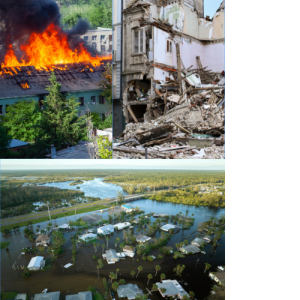The Polycrisis Puzzle: Unlocking A Resilient Future With Cutting-Edge Life-Saving Tech
In today’s rapidly evolving world, we’re witnessing an unprecedented convergence of crises that challenge the very fabric of our global society. From the relentless march of climate change to the unpredictability of pandemics and the dizzying pace of technological disruptions, these crises are not isolated events. They are interlinked, each amplifying the effects of the others, pushing our traditional crisis management strategies to their limits. This interconnected web of challenges has given rise to the concept of “polycrisis,” a term that captures the complex and multifaceted nature of global crises. Understanding and navigating this polycrisis demands innovative approaches and solutions, far beyond what conventional methods can offer. As we delve deeper into the nuances of these interconnected challenges, it becomes clear that technology holds the key to not just managing, but thriving in the face of such unprecedented complexity.
world, we’re witnessing an unprecedented convergence of crises that challenge the very fabric of our global society. From the relentless march of climate change to the unpredictability of pandemics and the dizzying pace of technological disruptions, these crises are not isolated events. They are interlinked, each amplifying the effects of the others, pushing our traditional crisis management strategies to their limits. This interconnected web of challenges has given rise to the concept of “polycrisis,” a term that captures the complex and multifaceted nature of global crises. Understanding and navigating this polycrisis demands innovative approaches and solutions, far beyond what conventional methods can offer. As we delve deeper into the nuances of these interconnected challenges, it becomes clear that technology holds the key to not just managing, but thriving in the face of such unprecedented complexity.
In the labyrinth of modern challenges, the phenomenon of polycrisis stands out as a monumental paradigm, offering a lens through which we can decipher the entangled web of global crises that confront us. This era, unlike any before, is characterized by a confluence of crises where climate change, pandemics, technological upheavals, and geopolitical tensions do not merely coexist but are deeply interwoven, each amplifying the other in a dance of complexity and unpredictability.
Peering into the Dynamics of Overlapping Crises
Polycrisis transcends the traditional understanding of crises as isolated events to be managed in isolation. It presents a scenario where crises are interconnected, with their interactions leading to unpredictable and compounded outcomes that span societal, economic, and environmental realms. This intricate interplay of diverse crises does not merely add up but synergizes, creating a cascade of effects that can overwhelm global systems and societies.
traditional understanding of crises as isolated events to be managed in isolation. It presents a scenario where crises are interconnected, with their interactions leading to unpredictable and compounded outcomes that span societal, economic, and environmental realms. This intricate interplay of diverse crises does not merely add up but synergizes, creating a cascade of effects that can overwhelm global systems and societies.
The narrative of climate change serves as a poignant illustration of this complexity. It’s not just an environmental crisis but a catalyst that exacerbates and is exacerbated by economic decisions, health outcomes, and social disparities. The resulting domino effect showcases how a polycrisis can leap across sectors, creating a ripple effect of challenges that demand not just attention but a concerted, global response.
The intricacies of polycrisis are further exemplified by the way technological advancements, while offering solutions, also pose new challenges, such as cybersecurity threats capable of disrupting essential services and infrastructures. This duality underscores the need for a nuanced approach to leveraging technology – one that acknowledges its potential both as a solution and a source of vulnerability.
Illuminating Real-World Manifestations through Scientific Insights
The fabric of polycrisis is woven with countless threads, each representing a crisis that affects our world. Recent explorations, such as those highlighted in the Science Daily article, bring to light the myriad ways these crises intersect and manifest in our daily lives. Through a tapestry of examples, the article sheds light on how environmental degradation, social upheaval, and technological disruptions converge, casting a spotlight on the tangible impacts of polycrisis on communities across the globe.
woven with countless threads, each representing a crisis that affects our world. Recent explorations, such as those highlighted in the Science Daily article, bring to light the myriad ways these crises intersect and manifest in our daily lives. Through a tapestry of examples, the article sheds light on how environmental degradation, social upheaval, and technological disruptions converge, casting a spotlight on the tangible impacts of polycrisis on communities across the globe.
A vivid example is the intersection of climate-induced droughts and food insecurity, which can spiral into socio-political unrest and mass migration. Such scenarios reveal the far-reaching consequences of polycrisis, where an environmental issue escalates into a multifaceted global challenge, underscoring the urgent need for integrated and adaptive responses.
The Urgency of Addressing Polycrisis
The science behind polycrisis not only illuminates the complexities we face but also sounds a clarion call for urgent action. It’s a reminder that addressing these interconnected crises requires more than piecemeal solutions; it demands a holistic understanding of how these crises are intertwined and a commitment to innovative, interdisciplinary approaches to mitigate their impacts.
polycrisis not only illuminates the complexities we face but also sounds a clarion call for urgent action. It’s a reminder that addressing these interconnected crises requires more than piecemeal solutions; it demands a holistic understanding of how these crises are intertwined and a commitment to innovative, interdisciplinary approaches to mitigate their impacts.
In navigating the labyrinth of polycrisis, the scientific community and innovators play a pivotal role. By uncovering the mechanisms that drive these interconnected challenges and proposing informed pathways for intervention, they lay the groundwork for developing resilient, adaptive, and sustainable systems. These efforts are not just about survival; they are about reimagining and reshaping our world to thrive in the face of unprecedented challenges.
Crafting a Future Resilient to Polycrisis
Acknowledging the existence and implications of polycrisis is the first step towards crafting the comprehensive, innovative approaches needed to navigate and mitigate it. Drawing on scientific research and evidence offers us a map to understand the contours of these challenges and to forge the multidimensional strategies required to address them.
existence and implications of polycrisis is the first step towards crafting the comprehensive, innovative approaches needed to navigate and mitigate it. Drawing on scientific research and evidence offers us a map to understand the contours of these challenges and to forge the multidimensional strategies required to address them.
As we delve deeper into the science behind polycrisis, we are not just seeking to understand a phenomenon but are embarking on a quest to unlock solutions that can lead us toward a resilient, adaptable, and sustainable future. The journey is complex, but with each step forward, we illuminate the path for generations to come, transforming challenges into opportunities for growth and innovation.
Navigating Beyond Traditional Boundaries
Traditional crisis management strategies, while effective in dealing with isolated incidents, stumble when confronted with the intricate and interconnected nature of polycrisis. These conventional approaches often rely on predefined response plans, linear problem-solving techniques, and sector-specific expertise. However, the polycrisis phenomenon defies such compartmentalization, with its crises bleeding into each other, creating a complex web of cause and effect that no single-domain solution can address.
management strategies, while effective in dealing with isolated incidents, stumble when confronted with the intricate and interconnected nature of polycrisis. These conventional approaches often rely on predefined response plans, linear problem-solving techniques, and sector-specific expertise. However, the polycrisis phenomenon defies such compartmentalization, with its crises bleeding into each other, creating a complex web of cause and effect that no single-domain solution can address.
The inadequacy of traditional methods is most palpable in their struggle to anticipate the cascading effects of interconnected crises. For instance, a climate-induced natural disaster does not merely trigger an environmental response but also has profound implications for public health, economic stability, and social cohesion. Traditional crisis management might tackle each consequence in isolation, failing to grasp or address the underlying interconnectedness that amplifies the overall impact.
The Call for an Integrated Approach
The evolution towards a more integrated approach to crisis management is not just a preference but a necessity. This new paradigm emphasizes the importance of understanding the systemic interconnections between various crises, advocating for solutions that are as multifaceted as the challenges they aim to solve. An integrated approach leverages cross-disciplinary insights, combining expertise from environmental science, technology, social sciences, and beyond to forge comprehensive strategies that can adapt to the dynamic nature of polycrisis.
more integrated approach to crisis management is not just a preference but a necessity. This new paradigm emphasizes the importance of understanding the systemic interconnections between various crises, advocating for solutions that are as multifaceted as the challenges they aim to solve. An integrated approach leverages cross-disciplinary insights, combining expertise from environmental science, technology, social sciences, and beyond to forge comprehensive strategies that can adapt to the dynamic nature of polycrisis.
Leveraging Advanced Technology
At the heart of this integrated approach lies the transformative potential of advanced technology. Technological innovation offers unprecedented opportunities to enhance crisis management, providing tools that can monitor, model, and manage the complexities of interconnected crises in real-time. For example, big data analytics can uncover hidden patterns and predict crisis trajectories, while artificial intelligence (AI) can optimize resource allocation and response strategies across multiple crisis domains simultaneously.
Moreover, technology facilitates a level of communication and collaboration that was previously unimaginable. Digital platforms can unite stakeholders from across the globe, enabling the rapid exchange of information and coordinated action. This not only accelerates response times but also democratizes crisis management, involving communities in the decision-making processes that affect their lives directly.
Adaptive Systems for a Changing World
The shift towards technology-enhanced, integrated crisis management also acknowledges the importance of adaptability. In a world where the only constant is change, crisis management systems must be designed for flexibility, capable of evolving in response to new information and shifting scenarios. This requires a departure from rigid planning towards more agile methodologies that can pivot in real-time, informed by continuous data analysis and feedback loops.
Conclusion: A New Horizon for Crisis Management
The transition to more holistic and technologically integrated crisis management strategies represents a leap forward in our ability to navigate the challenges of the polycrisis era. By moving beyond the limitations of traditional approaches, we can develop adaptive, resilient systems that are prepared to meet the complexities of interconnected crises head-on. This evolution is not just about managing crises but about transforming them into opportunities for innovation, growth, and sustainability, lighting the way towards a more resilient future.
In embracing this paradigm shift, the path forward demands collaboration, innovation, and a bold willingness to reimagine the foundations of crisis management. With advanced technology as our ally, we stand on the brink of a new era in which the daunting complexities of polycrisis can be navigated with confidence and foresight.
Economic Reverberations: Polycrisis scenarios often have profound economic implications. For instance, a global health pandemic can cripple economies, leading to widespread unemployment, which in turn exacerbates social inequalities and unrest. The economic downturn affects global trade, creating a ripple effect that can destabilize economies far removed from the crisis epicenter.
Polycrisis scenarios often have profound economic implications. For instance, a global health pandemic can cripple economies, leading to widespread unemployment, which in turn exacerbates social inequalities and unrest. The economic downturn affects global trade, creating a ripple effect that can destabilize economies far removed from the crisis epicenter.
Environmental Catastrophes: Environmental crises, such as climate change, do not operate in isolation. Their impacts are felt across various sectors, from reducing agricultural productivity to exacerbating water scarcity. These environmental shifts contribute to and are exacerbated by other crises, creating a feedback loop that escalates the overall crisis scenario.
Sociopolitical Instabilities: The interconnected nature of crises in a polycrisis scenario can lead to sociopolitical instability. Economic pressures, environmental disasters, and health emergencies can undermine trust in institutions, fuel conflict, and provoke migrations, further straining global solidarity and cooperation.
Technological and Cyber Vulnerabilities: In our interconnected world, technological advancements bring both solutions and vulnerabilities. Cybersecurity threats, misinformation campaigns, and technological disruptions can exacerbate existing crises, demonstrating how technological challenges are integral to the polycrisis landscape.
Polycrisis is inherently global in its scope and impact. Its interconnected nature means that a crisis originating in one part of the world can have immediate and far-reaching effects on distant regions. This global interconnectedness requires a shift in perspective, urging us to view crises not as isolated incidents but as parts of a larger, more complex system that demands a coordinated, global response.
global in its scope and impact. Its interconnected nature means that a crisis originating in one part of the world can have immediate and far-reaching effects on distant regions. This global interconnectedness requires a shift in perspective, urging us to view crises not as isolated incidents but as parts of a larger, more complex system that demands a coordinated, global response.
Climate Change as a Catalyst: Climate change exemplifies the essence of polycrisis, acting as both a standalone crisis and a catalyst that exacerbates other crises. From intensifying natural disasters that strain resources and displace communities to impacting food security and public health, climate change is at the heart of the polycrisis web, illustrating the need for integrated solutions that address environmental sustainability alongside other crisis responses.
The COVID-19 Pandemic: The COVID-19 pandemic has served as a stark reminder of the polycrisis concept, highlighting how health crises can have cascading effects on economies, social structures, and global mobility. The pandemic’s intersection with other crises, such as misinformation, economic downturns, and healthcare inequalities, underscores the multifaceted challenges of managing crises in an interconnected world.
Addressing polycrisis requires a paradigm shift towards more integrated, holistic strategies that acknowledge the interconnectedness of global challenges. This approach calls for:
In delving deeper into the concept of polycrisis, it becomes evident that the challenges we face are not just more numerous but fundamentally different in their interconnectedness and complexity. Understanding polycrisis in its full scope is the first step toward developing the integrated, innovative strategies needed to navigate and ultimately thrive in this new era of global challenges.
At the core of HQE Systems’ ethos lies a profound understanding that the challenges we face today are unlike any before. Their suite of technologies is meticulously designed to address the demands of a world where crises are not isolated but deeply interwoven, demanding responses that are both dynamic and precise.
ethos lies a profound understanding that the challenges we face today are unlike any before. Their suite of technologies is meticulously designed to address the demands of a world where crises are not isolated but deeply interwoven, demanding responses that are both dynamic and precise.
Seamless Integration for a Connected World: HQE Systems’ platforms redefine the meaning of integration in technology, creating ecosystems where information flows unimpeded across borders and barriers. This seamless connectivity ensures that, whether for organizational needs or community well-being, stakeholders can access comprehensive, coherent insights derived from diverse data sources, facilitating informed decisions in real time.
Advanced Analytics for Deeper Insights: The backbone of HQE Systems’ offerings is its unparalleled capacity for deep data analysis. Leveraging cutting-edge AI, these technologies sift through the noise to find signals, offering predictive insights that guide proactive strategies. From monitoring environmental changes to understanding societal trends, HQE Systems empowers users with clarity and foresight.
Intuitive Design for Empowered Users: Recognizing that the power of technology is realized only when it is accessible, HQE Systems emphasizes intuitive, user-friendly interfaces. Designed with the end-user in mind, their solutions ensure that leveraging the full potential of advanced technology is a seamless experience, democratizing access to critical information and capabilities.
The true measure of HQE Systems’ impact is observed in its application across various sectors, where its technologies have fostered resilience, efficiency, and progress.
Systems’ impact is observed in its application across various sectors, where its technologies have fostered resilience, efficiency, and progress.
Enhancing Environmental and Community Resilience: In addressing environmental challenges and community safety, HQE Systems’ solutions have played a pivotal role. By integrating environmental monitoring with community engagement tools, they have facilitated more responsive and effective approaches to managing natural resources and safeguarding communities.
Optimizing Organizational Efficiency: Organizations across the spectrum, from non-profits to global corporations, have harnessed HQE Systems’ technologies to streamline operations, enhance decision-making, and innovate service delivery. This optimization drives not only economic benefits but also broader societal value by enabling organizations to respond more adeptly to the needs of the communities they serve.
Securing a Safer Cyber Environment: In the digital realm, HQE Systems has been instrumental in fortifying cybersecurity measures. Through advanced threat detection and response systems, they offer a bulwark against the ever-evolving landscape of cyber threats, protecting critical infrastructure and sensitive data.
In a world where change is the only constant, HQE Systems is committed to a philosophy of continuous innovation. This commitment ensures that their technologies not only meet the current demands but are also equipped to anticipate and adapt to future challenges.
Adapting to Tomorrow’s Needs: HQE Systems is deeply engaged in research and development, ensuring its solutions evolve in tandem with global trends and emerging needs. This forward-looking approach positions them to respond with agility to new challenges, safeguarding progress and well-being in an unpredictable world.
Collaborative Pathways for Broader Impact: Embracing the power of collaboration, HQE Systems engages with a broad network of partners, from academic institutions to industry leaders. These collaborations enrich their ecosystem with diverse perspectives, driving innovation that is both inclusive and impactful.
Vision for a Thriving Future: HQE Systems is not just responding to today’s challenges but is also shaping the future. By exploring the frontiers of technology—from quantum computing to next-generation AI—they are laying the groundwork for breakthroughs that promise to transform our approach to the complex challenges of our times.
In the face of a world marked by complexity and interconnection, HQE Systems stands as a testament to the transformative power of technology. Through its innovative solutions, commitment to integration and analysis, and relentless pursuit of improvement, HQE Systems charts a path forward where technology is not just a tool for addressing challenges but a catalyst for creating a more resilient, efficient, and connected world.

Envisioning Resilience: A New Era of Technological Empowerment
As we stand at the crossroads of an increasingly complex and interconnected world, the imperative for harnessing advanced technological solutions has never been more evident. The challenges presented by the tapestry of global crises underscore the need for innovative approaches that not only navigate but transcend these complexities. Within this context, the role of technology—embodied by pioneers like HQE Systems—becomes not just instrumental but transformative. Their suite of solutions exemplifies the potent fusion of analytical depth, seamless connectivity, and intuitive design, showcasing the profound impact that technology can have on fostering resilience and efficiency across the fabric of society.
Looking toward the horizon, it’s clear that the path to a resilient future is paved with technology. However, this future is not predestined; it is one that we must actively shape, leveraging state-of-the-art solutions to build the foundations of a society that is robust, adaptable, and forward-looking. Envisioning this technology-driven resilient society, we see a world where crises do not spell disaster but are met with preparedness and agility. In this world, communities are not merely survivors of the next challenge but are thriving entities, equipped with the tools and insights to navigate the complexities of the modern age.
foundations of a society that is robust, adaptable, and forward-looking. Envisioning this technology-driven resilient society, we see a world where crises do not spell disaster but are met with preparedness and agility. In this world, communities are not merely survivors of the next challenge but are thriving entities, equipped with the tools and insights to navigate the complexities of the modern age.
HQE Systems, with its commitment to innovation and excellence, stands at the forefront of this journey. Their technologies are more than just responses to crises; they are beacons leading us toward a future where resilience is woven into the very fabric of our societies. As we embrace the potential of these advanced solutions, we open the door to a future that is not only prepared to face the challenges ahead but is poised to thrive amidst them, heralding an era of unprecedented resilience and prosperity.
HQE Systems is a certified Veteran Owned Company. For more information about HQE Systems Inc. and its emergency management, electronic security, and integration solutions, please visit www.hqesystems.com.

Contact: David Ditto (Early Warning Systems Subject Matter Expert)
Email: David.Ditto@hqesystems.com
Phone Number: (843) 872-7020
____________________
HQE Systems, Inc. | HQE is a Minority-Owned Service Disabled Veteran Owned Small Business (SDVOSB) providing full solutions for: Mass Notification Systems, Electronic Security Systems, Software Development Services, Contract Support, and Prototyping Services. As a brand-agnostic solutions provider, HQE prides itself in providing the BEST solution for the project. HQE possesses over 30+ factory certifications and reseller licenses to ensure our clients receive the highest quality service at the ideal budget. HQE can provide full design, installation, integrations, upgrades, and long-term maintenance support for any size and scope project.
